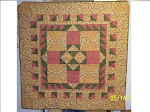I am asked about the prices that are charged for long arm quilting services. While I cannot speak for others, I can relate my own experiences. I am by no means an expert either! I'm just putting thoughts on paper, so to speak.
First of all, prices are all over the place, so you have to shop around to find the best fit. You should be able to talk to the quilter and explain what you want. You should also feel confident that what you want is what you will get!
I don't have a set price or a price list. I'll give you a price after I know how large the quilt is and what pattern you have chosen. Pattern choice is important because the pattern will help determine the amount of time spent at the machine. (See below.) If the pattern is very detailed and dense, it will take much longer to stitch out than a looser, less detailed pattern.
If you want to supply your own batting, that will save you just a few dollars. However, it is often not worth it as shipping batting will add to your total cost, if the quilt is to be shipped to the quilter.
If the backing is going to be pieced, I would very much prefer to do that myself and you will pay me to do it. Quilters not familiar with how a long arm machine on a frame "works" and do not understand the importance of a nice squared, straight pieced backing. Even the best constructed quilt top will suffer the consequences of a poorly prepared backing. Most long arm quilters will piece the back for you and will charge for it. Most are very particular regarding piecing, ironing, etc. and will indicate such on their website or when you contact them on the phone or in person.
The quilter must be at or near the machine at all times when it is running, if it is computerized. If not, then obviously, the quilter is guiding the machine. Time is money! With computerized equipment, the quilter must be close enough to the machine to observe problems like running out of bobbin thread or thread breakage. Problems must be dealt with promptly. If thread breaks or runs out, there is generally no harm done to the quilt, but quite a lot of time is wasted and the machine was running, unproductively. Sometimes a problem will damage the quilt on the frame, so it is imperative that the quilter learn to deal with all problems promptly.
Remember that the equipment the quilter uses is not inexpensive, and the equipment and supplies also require a LOT of space. If it was inexpensive and small, you would have it, right? OK. Quilting systems vary quite greatly in price, as does the quilting itself. Take a few minutes and check them out the next time you are at a quilt show or just surfing. Some run as high as $40,000! Regarding supplies, a professional will have quite a bit of money invested in threads, needles, batting, perhaps some backing fabrics, etc.
And, while we are at it, let's be honest . . . your quilt is probably not "show" material. Yes, we would all like to think they are, but face it, most, if not all that we make are not going to win any prizes. They may be very well constructed and when quilted are stunning, but whatever "it" is that is going to win the prize, our quilts just don't have "it." And, that's OK! I make quilts for enjoyment and to be useful. I do the very best job I can on each and every quilt and have FUN! So . . .
If your quilt did have "it" and you are going to enter it in a show, you probably wouldn't be reading this. It wouldn't matter how much the cost, you would be looking for a quilter who had one prizes themselves. You would pay them whatever they charge and wait whatever length of time you had to.
Come back! I will probably add more as I think of things I didn't say today!
Wednesday, December 2, 2009
Subscribe to:
Comments (Atom)
